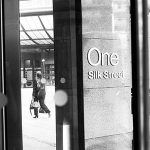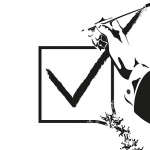ESG Champion Oscar Davies on being a role model at the Bar and the importance of allies.
What was your motivation to come out professionally as non-binary?
For me, there were two coming outs. The first was coming into the profession as a baby barrister and trying to get pupillage, and there’s always a difficulty in terms of to what extent you should out yourself. When everyone is essentially splitting hairs at that point, you don’t want to give them ammunition to not give you pupillage. I think there’s always a concern when you’re coming into a profession like the Bar, which is quite small-c conservative, that maybe you’re not going to be welcome there. If you met me in person, you would probably think I’m somewhere on the LGBTQ+ alphabet (although you might not know where), so I didn’t really have to come out in terms of sexuality – something fruity was assumed.
The non-binary coming out at work was more complicated in that it’s less well-known. I’ve always been quite fluid in my gender but I initially resisted the term because I found it quite restrictive. But I think things changed around the Taylor v Jaguar Land Rover Ltd case in 2020, which was the first case where it was considered that ‘non-binary’ could be a protected identity under section 7 of the Equality Act 2010, which relates to gender reassignment. When the judgment came out, a solicitor friend and I decided to co-write a substantive review of the judgment. When we’d finished, we decided we should put our pronouns at the top to show solidarity. I hadn’t secured tenancy yet, so I was scared I was going to out myself, but the judgment stated you shouldn’t be able to discriminate based on non-binary identity, so it’d be extremely ironic if chambers didn’t take me for that reason! I took a leap of faith and put my pronouns (which at the time were they/he) on the article.
‘My chambers asked what honorific I’d like on the barristers board; we went with ‘Mx’ – I put a photo on Twitter and it went semi-viral as a “legal first”’ Oscar Davies, Garden Court Chambers
Later, when I got tenancy, my chambers administrator asked what honorific I’d like on the barristers board and I thought that mine could be ‘Mx’. We went with that and I took a photo and put it on Twitter and it went semi-viral as a ‘legal first’. From that opportunity, I thought I could use my public voice to help others, so I started my Instagram, @nonbinarybarrister, where I share resources on trans and non-binary law and try to democratise the law to help those that it affects understand it.
As the first publicly recognised non-binary barrister, do you feel an obligation to be a role model?
Yes, definitely. I feel like I got here (being a public voice) by accident – it just so happened that this is how it panned out. But I certainly feel like I have an obligation to speak up for those who are more marginalised than me.
In terms of challenges in the legal sector, is it primarily the toxicity that can occur when discussing gender identity, or are other challenges more prevalent?
Somewhat ironically, when I came out as non-binary in the profession, I didn’t get that much pushback. I thought I would get much more. People were generally supportive, which was surprising as these aren’t typically the kind of people you might think would be open to it. It might have been that people thought it was a load of rubbish and they didn’t have the audacity to tell me, but to be honest, if you keep your belief to yourself, I couldn’t care less. In my day-to-day practice, it doesn’t really come up. My client is the most important person, and conveying their message to the judge is key.
The only hate I’ve had is more recently, delving into the ‘gender-critical’ cases as this overlaps with a lot of my belief/discrimination work, with actors in that field making comments that are quite disrespectful. In reality, the fight for equitable rights for all should be a common cause; however, that cannot be done if parties attack each other, or target extremely marginalised groups for misconceived reasons.
Rights are not limited as percentages on a pie chart; marginalised groups can gain rights without taking away the hard-fought rights of others. Presenting rights as mutually exclusive misunderstands their very nature: rights can (and should) be extended for each group that faces adversity in society. This is crucial for society to become fairer.
Is there anything the legal sector could be doing better in terms of representing and supporting non-binary colleagues?
Non-binary people aren’t going away, no matter how much hate is expressed towards us. I truly think that the seeming increase in non-binary people is more about people feeling confident enough to say it, especially as Gen Z comes through.
In terms of support, having a non-binary person’s back when they’re in the room is important, but also when they’re outside the room, is really important. If I tell you my pronouns are they/them, you should try your hardest to get them right. If you get it wrong once or twice, no-one is going to be mad at you, but you should at least make the effort, and correct others if you hear them using the wrong ones. Non-binary people shouldn’t have to do all the work. I’m happy doing a lot of the heavy lifting, but allies also need to pull their socks up – whether it’s putting pronouns in your email signature or on LinkedIn, or checking in on your trans and non-binary colleagues. LB














